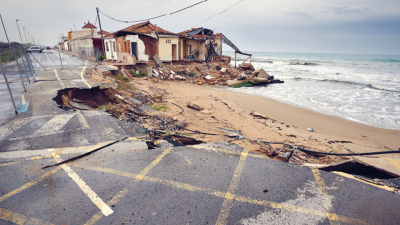- Home
- Discover
- Media Releases
- mareXtreme
mareXtreme research starts
The third DAM research mission mareXtreme started on January 1, 2024: Over the next three years, around 200 scientists from a total of 29 research institutions and partner organizations will investigate how the risk management of extreme marine events and natural hazards can be improved. Achim Kopf from MARUM – Center for Marine Environmental Sciences at the University of Bremen is one of the initiators of the campaign, which is funded by the Federal Ministry of Education and Research (BMBF) and the science ministries of the northern German states (Bremen, Hamburg, Mecklenburg-Western Pomerania, Lower Saxony, Schleswig-Holstein) with a total of around 20 million euros. MARUM is involved in two of the four joint projects.
Extreme marine events and natural hazards trigger cascades of complex processes that mostly have regional, but also far-reaching global consequences. In Germany, for example, these include floods and storm surges, which often cause enormous damage to coastal buildings and infrastructure, as was the case in Germany in 2023. Marine heatwaves as a result of climate change can also trigger increased growth of microorganisms that are harmful to humans and animals, which can lead to a lack of oxygen in the sea and ultimately to mass fish mortality. In other regions of the world, tsunamis triggered by earthquakes or volcanic eruptions cause massive flooding and coastal disasters. The interactions of these often multiple extreme events and natural hazards as well as their long-term effects on marine ecosystems and coastal populations are therefore the focus of the third inter- and transdisciplinary DAM research mission entitled mareXtreme.
Socio-political framework conditions are an integral part of the mission's research activities. The aim is to significantly improve the predictive capacity of extreme marine events and natural hazards, to support the sustainable development of coastal communities and to strengthen the resilience of coastal society. For this reason, mareXtreme brings together researchers from various disciplines in close cooperation with stakeholders from politics, business and civil society. The aim is to develop socially reflected, solution-oriented knowledge for action - and thus enable science-based decisions in dealing with extreme marine events and natural hazards. One of the aims of mareXtreme is to develop powerful observation and early warning systems. Based on high-resolution, innovative observation data and models, it should be possible in future to quantify the probabilities and intensities of occurrence as well as the effects and consequences of extreme marine events and natural hazards in various scenarios. At the same time, the scientists are investigating various options for adaptation, prevention, protection and risk management in a participatory process.
The mareXtreme mission focuses on marine georisks, marine biological risks and physical-oceanographic risks, which are bundled in four joint projects and are directly linked to current and regional hazards and challenges:
- ElbeXtreme investigates the effects of physical-oceanographic extreme events on ecosystem services in the Elbe estuarine coastal system;
- METAscales researches the effects of and strategies for adapting to future physical-oceanographic extreme scenarios on German coasts;
- MULTI-MAREX develops improved options for action and forecasting for multiple extreme geomarine events such as seaquakes and tsunamis in the Mediterranean;
- PrimePrevention researches possibilities for predicting biological hazards for the German coasts to prevent socio-economic impacts.
Further information:
- Information on the third DAM research mission "Ways to improve risk management in the area of marine extreme events and natural hazards", short title mareXtreme, here: https://www.allianz-meeresforschung.de/kernbereiche/forschung/marine-extremereignisse-und-naturgefahren
- Link to the DAM press release here: https://www.allianz-meeresforschung.de/news/dritte-dam-forschungsmission-gestartet
Contact for queries:
Prof. Dr. Achim Kopf
MARUM – Center for Marine Environmental Sciences, University of Bremen
E-Mail: [Bitte aktivieren Sie Javascript]



